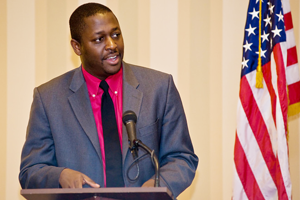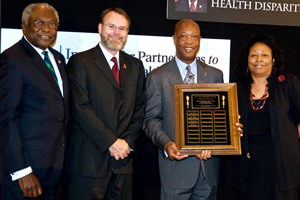Clyburn Lecture Series draws national, regional and state leaders for discussions on health disparities
May 12, 2011
 Dr. Garth Graham, deputy assistant secretary for minority health at the U.S. Department of Health and Human Services, was the featured speaker for the Clyburn Lecture Series panel discussion on how funding impacts health disparities research, policy and practice.
Dr. Garth Graham, deputy assistant secretary for minority health at the U.S. Department of Health and Human Services, was the featured speaker for the Clyburn Lecture Series panel discussion on how funding impacts health disparities research, policy and practice.
 Dr. John Ruffin, second from right, is shown with U.S. Rep. James E. Clyburn, Arnold School Dean Tom Chandler and Dr. Saundra Glover, director of the Institute for Partnerships to Eliminate Health Disparities, at the fourth annual James E. Clyburn Health Disparities Lecture.
Dr. John Ruffin, second from right, is shown with U.S. Rep. James E. Clyburn, Arnold School Dean Tom Chandler and Dr. Saundra Glover, director of the Institute for Partnerships to Eliminate Health Disparities, at the fourth annual James E. Clyburn Health Disparities Lecture.
The nation is advancing in the battle against health disparities and the challenge ahead is sustaining programs that are working, said Dr. John Ruffin, a leading federal health authority.
Ruffin, the director of the National Institute on Minority Health and Health Disparities (NIMHD), offered his optimistic report during the fourth annual James E. Clyburn Health Disparities Lecture at the University of South Carolina.
Named in honor of U.S. Sixth District Rep. James Clyburn, the 2011 lecture series was expanded to two days (April 28 – 29) and drew a cast of ranking national leaders in areas of health services, policy and research.
"The most important thing that has to happen in the next decade is sustaining (the programs) we have," Ruffin said.
Two initiatives offer particular promise -- one that allows the NIMHD to repay loans for researchers who perform health disparities research and another that provides direct grants to community based organizations, he said.
The loan repayment program has so far supported some 2,300 researchers and has become so popular the institute "can't keep up with number of applications," Ruffin said.
With authority to support community based participatory research, Ruffin said even nursing homes, churches and other faith-based organizations can now apply for funding to combat health disparities.
In South Carolina, the Arnold School of Public Health has a long track record of working with faith-based organizations, such as the AME Church.
The two-day lecture event, sponsored by the Arnold School and the Institute for Partnerships to Eliminate Health Disparities, attracted a crowd of largely healthcare professionals, community leaders, academics, and students.
On Thursday, Dr. Garth Graham, deputy assistant secretary for minority health at the U.S. Department of Health and Human Services, warned that minorities have a stake in better understanding the ramifications of health care reforms making their way through Congress.
"The same effort people spend in understanding sports, the same effort people put into understanding how our cars run, we need to put in the same effort to understand what's going on with our healthcare system," he said.
The lecture series also included a Health Disparities Community Town Hall Meeting, which centered on the question, "How Will Current State and Federal Budget Cuts Impact All Health-Related Services Provided to the Next Generation?" The panelists included state agency leaders who addressed topics ranging from funding for Medicaid programs, mental health services, and maternal and child health, including the high rates of low birth-weight infants.
Dr. Saundra Glover, director of the Institute for Partnerships to Eliminate Health Disparities, said, "This Town Hall Meeting clearly shows that people have a great deal of interest in the programs that affect their families and are seeking information. We look forward to being part of this discussion and want to work to coordinate similar meetings around the state."
A scientific poster session showcased health disparities research and practice being conducted by USC faculty members, research staff, and students, as well as community, clinical, and/or agency partners.
Poster contest winners were:
- First place: Tracey Thomas, Shaun Owens, Daniela Friedman and James Hebert; "Discovering New Strategies for Delivering Prostate Cancer Information in a Faith-Based African-American Community." Ms. Thomas, a doctoral student in the Arnold School's Department of Health Promotion, Education, and Behavior, accepted the award for the group.
- Second Place: Sara Wagner, James Burch, Matteo Bottai, Robin Puett, Dwayne Porter, Susan Bolic-Aldrich, Tom Temples, Rebecca Wilkerson, John Vena and James Hebert: "Groundwater Uranium and Cancer Incidence in South Carolina." Dr. Burch, who accepted the award for the research group, is an assistant professor of epidemiology and researcher with the South Carolina Statewide Cancer Prevention and Control Program.
- Third Place: Jordan Mitchell, Kevin Bennett and Amy Martin; "Poverty and Rural Effects on Edentulism Prevalence." Mitchell, a doctoral student in the Arnold School's Department of Health Promotion, Education, and Behavior, accepted the award for his research group.
Click here for more information about the Institute for Partnerships to Eliminate Health Disparities.



_01.jpg)
_02.jpg)